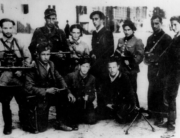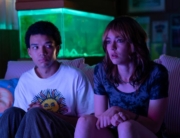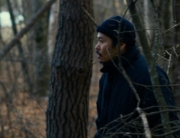With Genesis 2.0, Swiss filmmaker Christian Frei has stitched together an expansive, awe-inspiring, and ominous window into the future of genetic research. “Humans are bold and have vision, and they will sometimes follow that to their death,” declares world-renown geneticist researcher George Church, one of the documentary’s many subjects. Indeed, much of the themes explored follow the contradicting parallels between curiosity and innovation on the one hand, and creative destruction and the apocalypse on the other.
The film primarily focuses a group of Yakut hunters who journey into the frozen, uninhabited wastelands of the New Siberian Islands in search of mammoth tusks—the rare ivories sell for an incredible sum of money as sculptures in China. During the hunting season, the hunters presumably make more money than they otherwise would. However, Frei points out through his voice-over that middlemen earn most of the profit. His lenses capture the men digging and drilling through permafrost and frozen soil while battling the dangerous, alienating terrain—the mainland is more than 350 kilometers away across Arctic waters.
Meanwhile, back in civilization, researchers from South Korea, China, Russia, and the United States conduct molecular research in an effort to clone the extinct woolly mammoth. The hunters’ 2013 discovery of the best-preserved mammoth in the Siberian wasteland, fully intact with clumps of hair, could provide scientists with the key to the mammoth’s resurrection.
Frei takes us through the plethora of genetic cloning projects and research from around the world. From the genetic engineering competitions in Boston to the commercial dog cloning company in Seoul and gene banks in Shenzhen, China, the film explores the current status of genetic research, the cloning of the woolly mammoth being the ambitious next step.
Genesis 2.0 is absolutely gargantuan in its themes. The notion of “perfecting” animal genomes evokes an almost comic level of human hubris. At times, the contemplative shots of various scientists intellectually drooling over screen shots of cells being implanted for cloning resembles the archetypical sci-fi dystopia. We’ve seen this over and over in literature and movies—humanity trying to “play god”—and we know how this type of story ends. Yes, there’s potential for finding cures for diseases or ways to live longer. But there’s also the attempt to define human nature or “ideal” genes, notions that are anathema to the novelties and diversities that define the human experience. Just who will get to define human nature or what is “ideal?” Should any one even have the right to do so?
Frei provides a stark narrative contrast, paralleling the perspectives of the indigent mammoth hunters, risking their lives to find ivory for first-world merchants, next to the wide-eyed researchers sitting comfortably in their white, sterile labs. There’s desperation in the Yakut hunters’ eyes—Frei’s choice to overlay narration of an ominous Yakut folktale sends chills down the spine—and one can’t help but feel a certain degree of foreboding in the gene modification enterprise.
Genesis 2.0 will leave viewers intrigued, awed, horrified, and unsettled. But it should also inspire more conversation over what we are trying to achieve with synthetic biology and gene research.
Genesis 2.0 – Trailer – www.genesis-two-point-zero.com from Christian Frei on Vimeo.







Leave A Comment